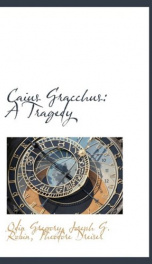caius gracchus a tragedy

A Tragedy BY ODIN GREGORY - Introduction OR three centuries, the English metric drama has remained sterile of any notabIe production. It may well be that Shakespcrc set a standard too high for any other mortal to attain, even in the ages to come. Certain it is that the efforts of Massinger, of R arlo ve, of Ben Jonson, of Beaumont, of Fletcher, of Middleton, and of a11 the others of that brilliant galaxy of the Elizabethan period, carried no appeal to the generations that follo ved. The very titles of their great plays, such as Tamburlaine, The Jew of Malta, cc Duke of Milan, The Fatal Dowry, The Maid of the Inn, The Fall of Sejanus, Volpone, sound strange in modern ears. In France, the works of Racine, of Molihre, of Corneille and of Voltaire continue a splendid history, to which Hugo and Rostand added no mean measure of lustre. The Italian revival may be continued down to the Eighteenth Century, when it produced the simple intensity of Alfieri. In the literature of Germany, Schiller, Goethe and Hauptmann made the Eighteenth and Xneteenth Centuries glorious. But in the English language, the actor-managerplaywright from Stratford stands by himself-a very Colossus of the ages. He marks the beginning, and, thus far, the end, of the influence of the Renaissance on our poetic drama. The great Greek poets laid the foundation of the harmonic expression of thought and action. And there is, in our language, no surviving personality whose plays affirmatively force our attention, between their time, and the day of Shakesperenor since. It may be that the day of the exact and exalted poetic drama, whatever its inherent literary or social value, has gone. Life may have adjusted its ends permanently to a different arrangement or beat of thought. Admitting, for arguments sake, that the Rab elaisian productions of Massinger, MarIowe and Ben Jonson failed to hold the popular attention for the same reason that Shakesperes Pericles, and the doubtful Titus Andronicus failed to hold it, still the ultimate fact remains that a few plays of Shakesperes constitute practically the whole of our heritage of poetic drama or important tragedy as known and given public attention today. The critics, the self-avowed experts, the expounders, and the textwriters, all tell us that the Elizabethan cult is very dead. They join in assuring the would-be venturer into the field of metric drama that he is chasing the proverbial undomesticated goose that every one who has tried his hand at the game has had nothing but his frenzy for his effort. Certain facts may, perhaps, seem to justify those solemn warnings. The ambitious essays into dramatic poetry of yesterday-where are they True-Bulwer Lyttons Richelieu is still occasionalIy played, by our persistent tragedians. Stephen Pbillips did his best in Herod his style was even hailed by some of our professionaI wiseacres as being a wonderful new product. But the public displayed no enthusiasm not even mild interest. So, PhilIips wan work died. Had he written less for the critics, and more for the people, he might have achieved real results... --This text refers to an alternate Paperback edition.
Users who have this book
Users who want this book
What readers are saying
What do you think? Write your own comment on this book!
write a commentif you like caius gracchus a tragedy try:
Other books by this author
Do you want to read a book that interests you? It’s EASY!
Create an account and send a request for reading to other users on the Webpage of the book!

